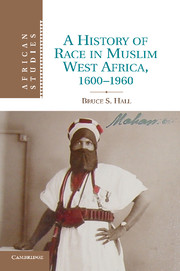Book contents
- Frontmatter
- Contents
- List of maps and figures
- Acknowledgments
- Note on orthography
- Abbreviations used in references
- Glossary
- Introduction
- PART ONE Race Along The Desert Edge, C. 1600–1900
- PART TWO Race And The Colonial Encounter, C. 1830–1936
- PART THREE The Morality of Descent, C. 1893–1940
- 5 Defending Hierarchy
- 6 Defending Slavery
- 7 Defending the River
- PART FOUR Race and Decolonization, C. 1940–1960
- Conclusion
- Index
- Misc-endmatter
- References
6 - Defending Slavery
The Moral Order of Inequality, c. 1893–1940
Published online by Cambridge University Press: 05 August 2011
- Frontmatter
- Contents
- List of maps and figures
- Acknowledgments
- Note on orthography
- Abbreviations used in references
- Glossary
- Introduction
- PART ONE Race Along The Desert Edge, C. 1600–1900
- PART TWO Race And The Colonial Encounter, C. 1830–1936
- PART THREE The Morality of Descent, C. 1893–1940
- 5 Defending Hierarchy
- 6 Defending Slavery
- 7 Defending the River
- PART FOUR Race and Decolonization, C. 1940–1960
- Conclusion
- Index
- Misc-endmatter
- References
Summary
ENDURING SLAVERY
To many observers, the institution of slavery seemed to have remained intact in the Niger Bend throughout the colonial period and beyond. Although slavery was officially abolished in Soudan in 1908, colonial authorities did little to encourage the liberation of slaves in the northern, desert-edge parts of the territory where colonial authority was most precarious. In these areas, the colonial administration developed policies designed to ensure that slaves remained subject to their masters. Faced with a League of Nations enquiry into the question of slavery in colonial territories in the 1930s, the French regime presented the investigators with a fiction of benevolent colonial emancipation policies that concealed their reliance on slavery as the basis of both the economic and political stability of French rule in the Niger Bend and other Sahelian territories. Such was the durability of slavery that French administrators were still debating the question in the 1950s, on the eve of independence. In 1961, an English antislavery activist named Robin Maugham published a book revealing that slavery remained alive in Timbuktu when he had visited the town in 1958, and that he had been able to purchase a slave himself. After independence in 1960, the first postcolonial government of Mali, led by Modibo Keita, made the elimination of slavery an important basis of its policy in the Niger Bend.
The persistence of slavery was the result of deliberate colonial policy in response to arguments made by slaveholders in the Niger Bend.
- Type
- Chapter
- Information
- A History of Race in Muslim West Africa, 1600–1960 , pp. 209 - 240Publisher: Cambridge University PressPrint publication year: 2011
References
- 1
- Cited by

